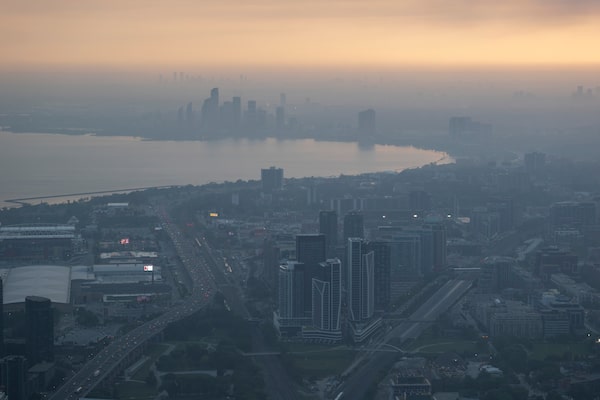
Smoke from wildfires is seen on June 28, 2023 in Toronto, Canada.Ian Willms/Getty Images
Smoke and low air quality warnings persisted on the weekend, affecting millions in North American cities and upending Canada Day celebrations in some areas.
Environment Canada warned of “high concentrations of fine particulate matter from the forest fires” on Saturday in the Greater Montreal area, conditions that it said “may continue until Sunday.” Similar warnings were in place for much of Quebec and southeastern Ontario.
Quebec’s largest city was still experiencing among the worst air quality in the world on Canada Day, according to according to rankings from IQAir, a Swiss pollution technology company.
In Ottawa, the agency said smoke is expected to last possibly into Saturday evening. There was no Environment Canada alert in and around Toronto on Saturday, although the city experienced air quality issues earlier in the week.
With more than eight million hectares of forest already burned this year, 2023 is the worst wildfire season on record, according to the Canadian Interagency Forest Fire Centre (CIFFC). In June, Canada and the United States replaced an “ad hoc” approach to helping each other battle forest fires with a formal agreement, after wildfire smoke from Canada affected millions with polluted air on the U.S. East Coast earlier that month.
Wildfire maps 2023: Tracking fires and air quality across Canada
South of the border, although the situation improved in recent days, air quality remained low for large swaths of the U.S., from the Midwest to the East Coast, owing to wildfire smoke from Canada, according to data from AirNow, a partnership of various U.S. agencies.
Cities like Washington, D.C., Chicago, Minneapolis, and New York were still in IQAir’s top 15 for worst air quality Saturday.
There were more than 500 active wildfires throughout Canada on Saturday, CIFFC data showed, with more than half deemed out of control. Most of the fires were in Quebec, British Columbia, and Alberta.
Poor air quality and wildfires have led to the cancellation of cultural and sports events in recent days, and affected preparations for Canada Day celebrations in some areas. Fireworks were cancelled in Quebec City and Montreal “in solidarity with the ongoing forest fires in Quebec,” organizers said, while they were still expected to be part of the show in Ottawa and Toronto.
In Quebec, where thousands were still under evacuation orders earlier this week, “weather conditions in the last few days reduced the intensity of several forest fires” and most evacuees were able to return home, according to the Ministry of Public Security.
In Western Canada, smoke lingered closer to the wildfires, with air quality statements affecting the territories and northern parts of the Prairies and Western provinces.
The Kee Tas Kee Now Tribal Council issued a mandatory evacuation alert Friday night for the Little Buffalo area in northern Alberta after high winds accelerated the growth of a wildfire. In B.C., evacuation orders were issued earlier this week by the Northern Rockies Regional Municipality and the Takla First Nation, and several other communities were under evacuation alert in the Peace River Regional District and the District of Tumbler Ridge.
At the peak of evacuations in May and June, tens of thousands were forced out of their homes mainly in Alberta, Quebec and Nova Scotia.
On Tuesday, the federal government launched its National Adaptation Strategy, saying it would help reduce risk and build climate-resilient communities facing direct consequences of worsening global warming, including increased wildfire risk.